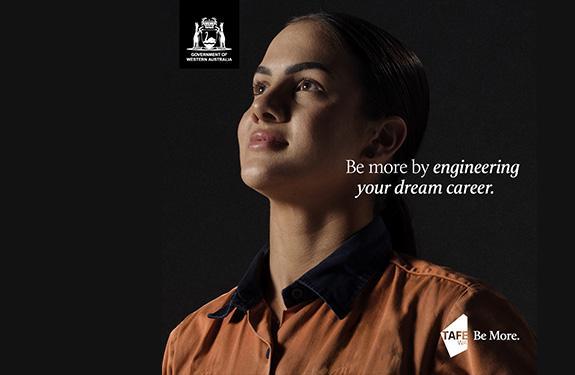Break stereotypes and break into your dream career!
The Women in Non-Traditional Trades (WINTT) TAFE scholarship program is designed to help encourage more women into roles that are traditionally male-dominated across building and construction, science, technology, engineering and maths (STEM).
The $2 million WINTT program offers a $5,000 scholarship payment per place to fund up to 400 places over four years for women enrolled in eligible Apprenticeships, Traineeships or institutional Qualifications at WA TAFE colleges.
Women who enrol to start in 2024 in select STEM and building and construction Qualifications at WA TAFE colleges are eligible for scholarship payments to support their path into a non-traditional trade or occupation.
Scroll down to find out what NR TAFE courses are selected for the scholarship and how to apply!
Scholarship Program Update
We are thrilled to announce that all scholarship places have been filled due to an overwhelming response from applicants.
Please keep an eye out for the re-opening of scholarship places at the beginning of 2025. We appreciate your interest and look forward to your applications next year!

Frequently Asked Questions (FAQs)
Why is the Western Australian Government offering this scholarship?
The scholarship is designed to improve women’s economic participation and equality in the workforce by increasing female participation in traditionally male dominated roles such as building and construction and science, technology, engineering and maths (STEM).
What are non-traditional trades and industries?
Occupations where women make up less than 25% of the total workforce are considered non-traditional. Refer to the Eligible Qualifications list for qualifications eligible for this scholarship.
How were the qualifications selected?
The qualifications are linked to occupations where women comprised less than 25% of the workforce based on the 2021 Census and are linked to STEM fields of education or the building and construction industry. In addition, there are a number of qualifications included that meet the regional skill needs, occupations in demand and labour market shortages identified by TAFE Colleges.
How does the scholarship work?
If you are planning or have already applied to commence an eligible non-traditional qualification and meet the eligibility requirements you can apply for a scholarship to assist with the costs associated with your training. $5,000 Scholarships will be available for both institutional and employment based training. Successful applicants will receive a one-off payment from the State Government upon enrolment and continuation of training past the withdrawal/census date stipulated by your TAFE College.
What can the scholarship be used for?
The funds are provided to assist with any costs associated with undertaking publicly funded training or overcoming barriers to participation. This can include items such as student fees, learning resources, mentoring, coaching, accommodation, transport, childcare, tools, work clothes, personal protective equipment, laptops/tablets, additional courses/workshops/seminars, work tickets and licenses.
How many scholarships will be awarded?
Each of the five TAFE College will award 20 Scholarships per annum over four years 2024 - 2027. A total of 400 scholarships will be awarded State wide.
When can I apply?
Applications will open 20 November 2023. Closing dates for applications will be determined by TAFE Colleges and advertised on their web sites
How will I know my application has been received?
You will receive an automatic notification on lodgement of your application.
How will applications be assessed?
Applicants will be assessed on the quality of their applications with respect to how well they address the three short written response questions:
- Describe your career goals and aspirations;
- What are the main reason(s) that you are applying for the scholarship?
- If successful, what would you use the scholarship money for?
Consideration will also be given to industry spread and regional location.
Who can apply for the scholarship?
To be eligible to apply for the Scholarship applicants must:
- be a person who identifies as a woman who has left school;
- be a Western Australian resident and an Australian citizen; or
- be a permanent visa holder or holder of an eligible visa sub-class as outlined in the Department’s VET Fees and Charges Policy 2023.
- commencing training in an eligible qualification (full time or part time) between 1 January and 31 December 2024;
- undertaking their course at a Western Australian TAFE College; and
- not be receiving another scholarship for their course of study.
How do I apply?
All applications must be submitted via the online WNTT application form available on your TAFE College website.
If I have already commenced a qualification on the eligible qualifications list can I apply for a scholarship for that qualification?
No. The scholarship is only available for those who commence training in their qualification between 1 January 2024 and 31 December 2024.
Can I apply if I am doing a VET qualification at school?
No. You must have left school and be planning or already applied for a place in one of the eligible qualifications in order to apply for the scholarship.
What training can I do?
A list of eligible qualification for the scholarship program are specified on the Eligible Qualifications list on your Colleges website. Eligible qualifications include apprenticeships, traineeships and institutional training.
How will I know if I have been awarded a scholarship?
Applicants will be advised of the outcome of their application by their TAFE College.
How do I claim the payment?
Scholarship recipients will be sent a payment claim form to complete and forward to the Colleges Finance Department. Once processed funds will be deposited in your bank account.
Will I need to report or provide receipts on what I spend the money on?
No.
If you need assistance writing your application, your local Jobs and Skills Centre and Aboriginal Training Services Team can help!